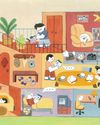
MAISY WU HAD LEARNED fortune-telling from her mah-mah, who’d read faces and palms in a stall in Temple Street Market, in Hong Kong. A decade later, as a university student in Vancouver, Maisy would tell fortunes at parties. Her dorm mates invariably thanked her for the advice she’d given while buzzed on hard lemonade.
Eventually, she decided to quit her job at the Vancouver Public Library and monetize her talent, specializing in Chinese forms of fortune-telling and divination. With a smallbusiness grant, she rented a studio on a gentrifying stretch of Pender Street, where she read palms and offered her own interpretation of kau chim, or lottery poetry. The space was clean and white, with a chrome kitchen table at one end opposite a shrine for the god Wong Tai Sin.
At first, when the strange new pandemic hit Vancouver, there was no drop-off in Maisy’s clientele. Apparently, people wanted her reassurances more than they cared about social distancing. But, when her business was declared nonessential, Maisy felt absolutely unprepared. She had only $300 in her savings account. Moreover, she was single. Her internet access was limited to the data on her phone. There was no laundry room in her building.
Maisy, whose estranged mother had come from wealth, had always preferred living close to the bone. Now, she wished that bone was encased in $100 bills.
Out of desperation, she made her fortunetelling business mobile, renaming it Curbside Divinations. Inspired by the takeout drivers and delivery trucks speeding past her window, she envisioned cycling up to a quarantined house and reading fortunes from the gate. Or from the hallway outside an apartment. Either would be more human contact than she’d had in weeks. She composed a press release and blasted her socials.
This story is from the July/August 2020 edition of The Walrus.
Start your 7-day Magzter GOLD free trial to access thousands of curated premium stories, and 8,500+ magazines and newspapers.
Already a subscriber ? Sign In
This story is from the July/August 2020 edition of The Walrus.
Start your 7-day Magzter GOLD free trial to access thousands of curated premium stories, and 8,500+ magazines and newspapers.
Already a subscriber? Sign In

Invisible Lives
Without immigration status, Canada's undocumented youth stay in the shadows

My Guilty Pleasure
"The late nights are mine alone, and I'll spend them however I damn well please"

Vaclav Smil Is Fed Up
The acclaimed environmental scientist is criticizing climate activists, shunning media, and stepping back just when we need him most

It's Time for a Birth Control Revolution
What the pill teaches us about the failure - and future - of women's health care

Would You Watch a Play about Hydro Electricity?
How documentary theatre struck a chord in Quebec

Still Spinning
One record chain has bet big on a new appetite for physical media

Just So You Know, I Love My Mother
In many ways, multi-generational living makes sense. But that doesn't make it easy

Art of the Steal
Why are plundered African artifacts still in Western museums?

Canada in the Middle
What role can we play in easing the war in Gaza?
Canadian Multiculturalism: A Work in Progress
As we mark fifty years since the adoption of Canada’s federal multiculturalism policy, human rights advocate AMIRA ELGHAWABY celebrates its merits and reflects on the work that is yet to be done when it comes to inclusion, acceptance, and fighting systemic racism in our country.